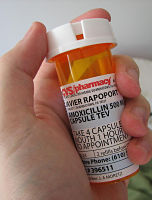 BY SALVATORE PIZZURO
BY SALVATORE PIZZURO
NEWJERSEYNEWSROOM.COM
The administration of psychotropic medication to school children continues on a massive scale. A recent cable television interview of a young man who took Ritalin against his will provided an example of the dangerous result of the involuntary administration of such a drug. The young man indicated that the drug “nearly ruined my life”. He discontinued the medication as a young teen and warns families about the side effects of such drugs.
Jim Gottstein, a Graduate of Harvard Law School and the founder and Executive Director of the Law Project for Psychiatric Rights (or PSYCH-RIGHTS), a national civil rights advocacy group and Think Tank, has fought against having such medication prescribed for children. In addition, Gottstein suggests that the wide-spread prescription of such drugs constitutes “Medicaid Fraud”. According to Gottstein:
“The massive psychiatric drugging of America's children, particularly poor, disadvantaged children & youth through Medicaid and in foster care is an unfolding public health catastrophe of massive proportions. This catastrophe is being caused by the fraudulent promotion of these harmful practices by pharmaceutical companies sacrificing children and youth's health, futures and lives on the altar of corporate profits”.
The administration of medication for purposes that the FDA deems to be inappropriate, constitutes an “Off Label” drug. The pharmaceutical industry has been held accountable for the use of Medicaid funds for such medication. As Gottstein points out:
“In 2009, Eli Lilly agreed to pay $1.4 Billion in criminal and civil penalties for such off-label promotion of Zyprexa and Pfizer agreed to pay $2.3 Billion for the illegal off-label promotion of Geodon and other drugs. In 2010, Astra-Zeneca agreed to pay $520 million for the illegal off-label promotion of Seroquel for use in children, and Forest Laboratories agreed to pay $309 million for the illegal off-label promotion of the use of Lexapro and Celexa in children. However, despite these large penalties by the drug companies, the practice has not stopped. It is merely a cost of doing business to these pharmaceutical Goliaths and, in fact, caps their liability for these crimes. Most importantly, these settlements have not stopped the practice of child psychiatrists and other prescribers giving these drugs to children and youth and Medicaid continuing to pay for these fraudulent claims”.
Gottstein also points out that under the federal False Claims Act:
“It is a False Claim to knowingly (A) present, or cause to be presented, a false or fraudulent claim for payment or approval, or (B) make, use, or cause to be made or used, a false record or statement material to a false or fraudulent claim to the Federal Government. (31 USC §3729(a)(1))”.
According to David Sessions of Politics Daily, foster children are more than three times more likely to have psychotropic medications prescribed for them. In addition, many of these drugs are considered by the FDA to be inappropriate and dangerous for children. Yet, psychiatrists and pediatric neurologists continue to prescribe the medication for children, and in greater numbers for foster children. Eventually, the physicians receive Medicaid reimbursements, even though it is illegal to do so.
Gottstein has presented data that indicates that children who receive psychotropic medications for long periods are more likely to become drug-addicted as adults. Moreover, there is a higher rate of suicide among these children.
It is time for the FDA to carefully scrutinize the medications that are prescribed for children and to more faithfully enforce the False Claims Act.
